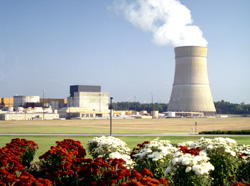
Nuclear Power
Is this one reason the UK has seemingly been among the more reluctant European nations to support imposing sanctions on Russia for its invasion of Ukraine? The Guardian reported Wednesday that Britain is talking with Russia and its Rosatom atomic industry about building a new VVER reactor in the UK. A Memorandum of Understanding, signed in September 2013 but apparently not publicly revealed then, was “designed to be the most effective means of enabling Rosatom to prepare for entry into the United Kingdom civil nuclear market.”
Today in the Guardian, a follow-up article seems to ask the same question, as well as wonders about the long-term implications of relying on Russia as a major energy supplier: “Clearly there is something jarring about the Department of Energy and Climate Change (Decc) boasting about its positive negotiations with the Russians over building a nuclear power station in Britain just as a summit is due to begin in London about what sanctions can be taken against Moscow over its involvement in the Crimea.
“If Vladimir Putin is threatening to once again use energy as a political weapon in the Ukraine by cutting off the country’s gas exports, then this is a bad moment to talk about state-owned Rosatom taking a critical stake in UK power infrastructure through the construction of an atomic plant.”

Not what a utility already facing pressure across the country to close unsafe aging reactors wants revealed: the shoes of two employees at Entergy’s Grand Gulf reactor in Mississippi set off radiation monitors at the plant. Investigation found a radioactive puddle, about two feet in diameter and 2 inches deep, inside the protected area of the plant. No word yet on how a radioactive puddle formed there.
And another utility facing pressure to close dangerous and expensive older reactors runs into a different kind of embarrassing situation: more than 70 reactor operators at Exelon nuclear sites filed a class action suit charging that the company has been shorting them on their pay. Seems Exelon hasn’t been paying its operators for the time they spend both before and after their shifts filling out documentation that is required for nuclear safety. Maybe that’s because Exelon isn’t particularly concerned about nuclear safety in the first place? The suit could eventually cover 600 reactor operators and could end up costing the company several million dollars.
Clean Energy
North Carolina seems to be accelerating its efforts to turn back the clock towards the stone age–at least in North Carolina. Since former Duke Energy executive Governor Pat McCrory took office, the state has been moving consistently away from some moderately progressive energy and environmental policies towards some that can most charitably be described as “pro-Duke”–the recent controversy over beneficial settlements toward Duke by the state’s environmental agencies only the most recent. But now the state has taken that giant step backwards: the state’s Department of Environment and Natural Resources has removed basic climate change information from its website. WRAL-TV reports that besides removing links to information from the front page of the site, “Two major reports on climate change are also missing from the site: a 100-page report on the possible economic impacts of greenhouse gas mitigation and the state’s 118-page Climate Action Plan, a multi-year project involving dozens of experts and policymakers. Both were commissioned by the state legislature, then controlled by Democrats, and completed in 2008.”
If you ever wondered when solar power would go mainstream, wonder no longer. Solar City has begun putting employees in about 50 Best Buy stores in Arizona, California, Oregon, New York and Hawaii to talk about its solar power systems and the advantages of the company’s leasing models. Will CVS be next?
Cincinnati, Ohio is the largest city in the U.S. to buy 100% renewable energy, a practice it began in 2012. The city briefly considered moving back to more conventional power, but decided this week to continue its 100% renewable policy–a decision made easier by that fact that not only is its power cleaner, it is also considerably cheaper than the fossil fuel/nuclear power option offered by Duke Energy.
 There is a reason why those, like the right-wing group ALEC, who attack rooftop solar power and the net metering policies that promote it are losing. The public really, really likes rooftop solar and net metering. A new poll taken in Florida, for example, found that 77% of voters there support net metering; only 13% oppose the policy. 71% oppose adding any new fees on net metered solar customers, an approach that ALEC and some utilities are espousing to slow down the growth of solar power in favor of fossil fuels and nuclear power. Let’s face it ALEC: your day has passed.
There is a reason why those, like the right-wing group ALEC, who attack rooftop solar power and the net metering policies that promote it are losing. The public really, really likes rooftop solar and net metering. A new poll taken in Florida, for example, found that 77% of voters there support net metering; only 13% oppose the policy. 71% oppose adding any new fees on net metered solar customers, an approach that ALEC and some utilities are espousing to slow down the growth of solar power in favor of fossil fuels and nuclear power. Let’s face it ALEC: your day has passed.
The rapid transformation of the electricity sector in Australia is continuing to confound the energy “experts.” No matter what they predict, actual energy demand continues to fall below their estimates. The reason isn’t that people are turning off their lights and refrigerators to save money, it’s because of the rapid growth of rooftop solar power (which reduces electric demand from utility power plants) and effectiveness of energy efficiency programs. While the penetration of rooftop solar is certainly higher in Australia than the U.S., particularly among low and moderate income households, the trends are the same in the U.S. and over the next few years will become just as noticeable.
Inside Washington
The South Carolina congressional delegation is apparently afraid they’re on the losing side of the battle over the future of the Department of Energy’s risky and expensive MOX plutonium fuel program. The Obama Administration has been trying for two years to end the program, and this year’s budget calls for the project to be put on cold standby until it is fully ended. The only reason it’s lasted this long has been the power of the delegation and its willingness to do thing like put holds on presidential nominations to extort continued federal pork dollars for the well-over-budget project. But fearful that this time they may lose, U.S. Sens. Lindsey Graham and Tim Scott and U.S. Rep. Joe Wilson recently sent a letter urging South Carolina Governor Nikki Haley to file a lawsuit–in their words, to “explore any legal avenues”–to keep the project going. Perhaps this year, this program finally will meet its well-deserved end.
Michael Mariotte
March 13, 2014
Permalink: https://www.nirs.org/2014/03/13/nuclear-newsreel-thursday-march-13-2014/
Comments are welcome! Say your piece above. Start a discussion. Don’t be shy; this blog is for you.
If you like GreenWorld, you can help us reach more people. Just use the icons below to “like” our posts and to share them on the various social networking sites you use. And if you don’t like GreenWorld, please let us know that too. Send an e-mail with your comments/complaints/compliments to nirs@nirs.org. Thank you!
Note: If you’d like to receive GreenWorld via e-mail daily, send your name and e-mail address to nirs@nirs.org and we’ll send you an invitation. Note that the invitation will come from a GreenWorld@wordpress.com address and not a nirs.org address, so watch for it.




Hawaii is killing solar, the utility is acting outside the law and preventing Pv from going in.